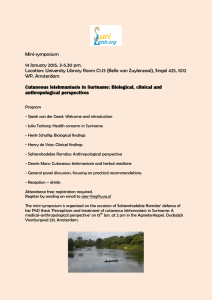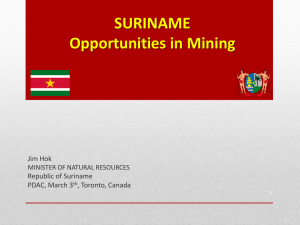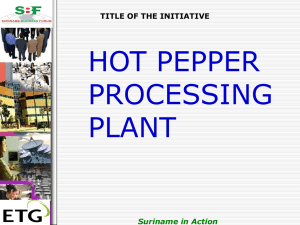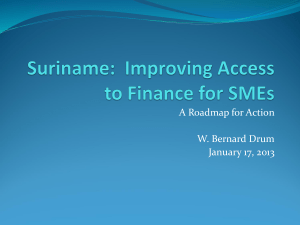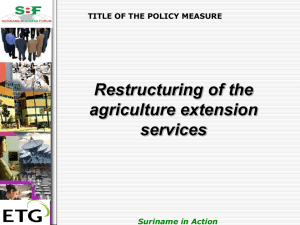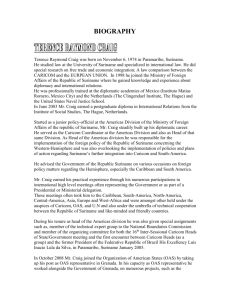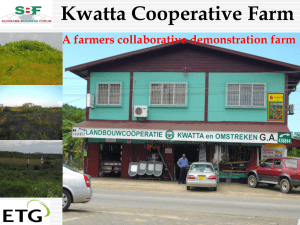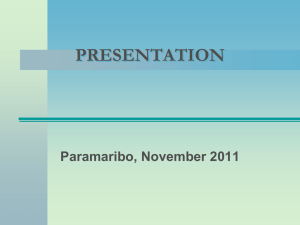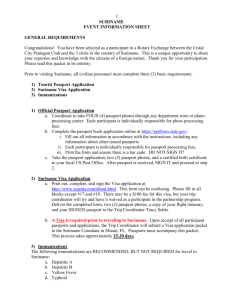Official Name: Republic of Suriname
advertisement
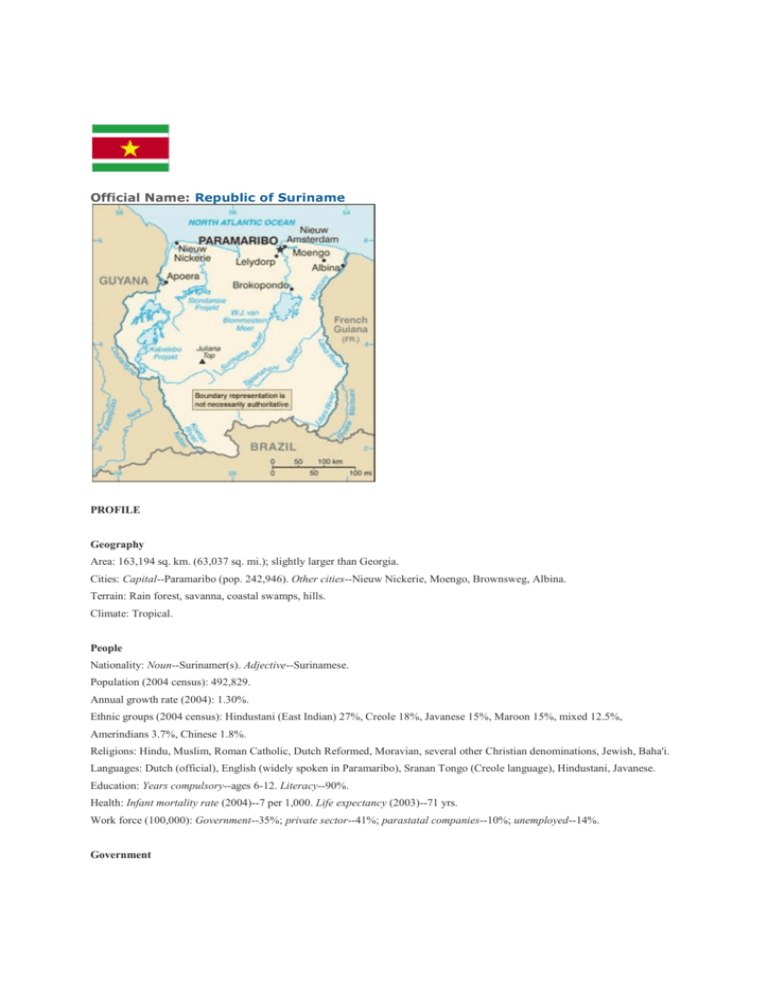
Official Name: Republic of Suriname PROFILE Geography Area: 163,194 sq. km. (63,037 sq. mi.); slightly larger than Georgia. Cities: Capital--Paramaribo (pop. 242,946). Other cities--Nieuw Nickerie, Moengo, Brownsweg, Albina. Terrain: Rain forest, savanna, coastal swamps, hills. Climate: Tropical. People Nationality: Noun--Surinamer(s). Adjective--Surinamese. Population (2004 census): 492,829. Annual growth rate (2004): 1.30%. Ethnic groups (2004 census): Hindustani (East Indian) 27%, Creole 18%, Javanese 15%, Maroon 15%, mixed 12.5%, Amerindians 3.7%, Chinese 1.8%. Religions: Hindu, Muslim, Roman Catholic, Dutch Reformed, Moravian, several other Christian denominations, Jewish, Baha'i. Languages: Dutch (official), English (widely spoken in Paramaribo), Sranan Tongo (Creole language), Hindustani, Javanese. Education: Years compulsory--ages 6-12. Literacy--90%. Health: Infant mortality rate (2004)--7 per 1,000. Life expectancy (2003)--71 yrs. Work force (100,000): Government--35%; private sector--41%; parastatal companies--10%; unemployed--14%. Government Type: Constitutional democracy. Constitution: September 30, 1987. Independence: November 25, 1975. Branches: Executive--President, Vice President, Council of Ministers. Legislative--elected 51-member National Assembly made up of representatives of political parties. Judicial--Court of Justice. Administrative subdivisions: 10 districts. Political parties: Governing coalition--National Party of Suriname (NPS); Progressive Reform Party (VHP); Pertjaja Luhur; A Combination, a coalition of General Interior Development Party (ABOP), Brotherhood and Unity in Politics (BEP), and Seeka; Suriname Workers Party (SPA); Democratic Alternative '91 (DA '91). Other parties in the National Assembly--National Democratic Party (NDP), Democratic National Platform 2000 (DNP 2000), Alternative 1 (A1), Party for Renewal and Development (BVD), Javanese Indonesian Peasants Party (KTPI). Suffrage: Universal at 18. Economy GDP (2008 est.): $2.81 billion (Source: IMF). Annual growth rate real GDP (2007 actual): 5.5%. Per capita GDP (2007 est.): $4,830. Inflation (2007): 7.0%. Natural resources: Bauxite, gold, oil, iron ore, other minerals; forests; hydroelectric potential; fish and shrimp. Agriculture: Products--rice, bananas, timber, citrus fruits, fish and shrimp. Industry: Types--alumina, oil, gold, fish and shrimp processing, lumber. Trade (Source: IMF): Exports (2007)--$1.542 billion: alumina, gold, crude oil, wood and wood products, rice, bananas, fish, and shrimp. Major markets (2007)--Canada (23%), Norway (14.4%), U.S. (12.1%), Trinidad (7.2%), France (5.4%), Iceland (2.1%). Imports (2007)--$1.242 billion: machinery and transport equipment, manufactured goods, mineral fuels including lubricants, food and live animals. Major suppliers (2007)--U.S. (31.7%), Netherlands (20.4%), Trinidad and Tobago (17.9%), Japan (3.6%), China (5.5%), Brazil (2.9%). PEOPLE Most Surinamers live in the narrow, northern coastal plain. For its size, the population is one of the most ethnically diverse in the world. Each ethnic group preserves its own culture, and many institutions, including political parties, tend to follow ethnic lines. Informal relationships vary: the upper classes of all ethnic backgrounds mix freely; outside of the elite, social relations tend to remain within ethnic groupings. All groups may be found in schools and the workplace. HISTORY Arawak and Carib tribes lived in the region before Columbus sighted the coast in 1498. Spain officially claimed the area in 1593, but Spanish and Portuguese explorers of the time gave the area little attention. Dutch settlement began in 1616 at the mouths of several rivers between present-day Georgetown, Guyana, and Cayenne, French Guiana. Suriname became a Dutch colony in 1667. The new colony, Dutch Guiana, did not thrive. Historians cite several reasons for this, including Holland's preoccupation with its more extensive (and profitable) East Indian territories, violent conflict between whites and native tribes, and frequent uprisings by the imported slave population, which was often treated with extraordinary cruelty. Barely, if at all, assimilated into plantation society, many of the slaves fled to the interior, where they maintained a West African culture and established the six major “Bush Negro” (or Maroon) tribes in existence today: the Djuka, Saramaccaner, Matuwari, Paramaccaner, Quinti, and Aluku. Plantations steadily declined in importance as labor costs rose. Rice, bananas, and citrus fruits replaced the traditional crops of sugar, coffee, and cocoa. Exports of gold rose beginning in 1900. The Dutch Government gave little financial support to the colony. Suriname's economy was transformed in the years following World War I, when an American firm (ALCOA) began exploiting bauxite deposits in East Suriname. Bauxite processing and then alumina production began in 1916. During World War II, more than 75% of U.S. bauxite imports came from Suriname. In 1951, Suriname began to acquire a growing measure of autonomy from the Netherlands. Suriname became an autonomous part of the Kingdom of the Netherlands on December 15, 1954, and gained independence, with Dutch consent, on November 25, 1975. Most of Suriname's political parties took shape during the autonomy period and were overwhelmingly based on ethnicity. For example, the National Party of Suriname found its support among the Creoles, the Progressive Reform Party members came from the Hindustani population, and the Indonesian Peasant's Party was Javanese. Other smaller parties found support by appealing to voters on an ideological or pro-independence platform; the Partij Nationalistische Republiek (PNR) was among the most important. Its members pressed most strongly for independence and for the introduction of leftist political and economic measures. Many former PNR members would go on to play a key role following the coup of February 1980. Suriname was a parliamentary democracy in the years immediately following independence. Henk Arron became the first Prime Minister and was re-elected in 1977. On February 25, 1980, 16 noncommissioned officers overthrew the elected government, which many accused of inefficiency and mismanagement. The military-dominated government then suspended the constitution, dissolved the legislature, and formed a regime that ruled by decree. Although a civilian filled the post of president, a military man, Desi Bouterse, actually ruled the country. Throughout 1982, pressure grew for a return to civilian rule. On December 8, 1982, military authorities cracked down, arresting and killing 15 prominent opposition leaders, including journalists, lawyers, and trade union leaders. Following the murders, the United States and the Netherlands suspended economic and military cooperation with the Bouterse regime, which increasingly began to follow an erratic but often leftist-oriented political course. The regime restricted the press and limited the rights of its citizens. The economy declined rapidly after the suspension of economic aid from the Netherlands. Continuing economic decline brought pressure for change. During the 1984-87 period, the Bouterse regime tried to end the crisis by appointing a succession of nominally civilian-led cabinets. Many figures in the government came from the traditional political parties that had been shoved aside during the coup. The military eventually agreed to free elections in 1987, a new constitution, and a civilian government. Another pressure for change had erupted in July 1986, when a Maroon insurgency, led by former soldier Ronnie Brunswijk, began attacking economic targets in the country's interior. In response, the army ravaged villages and killed suspected Brunswijk supporters. Thousands of Maroons fled to nearby French Guiana. In an effort to end the bloodshed, the Surinamese Government negotiated a peace treaty in 1989 with Brunswijk, called the Kourou Accord. However, Bouterse and other military leaders blocked the accord's implementation. On December 24, 1990, military officers forced the resignations of the civilian president and vice president who had been elected in 1987. Military-selected replacements were hastily approved by the National Assembly on December 29. Faced with mounting pressure from the U.S., other nations, the Organization of American States (OAS), and other international organizations, the government held new elections on May 25, 1991. The New Front (NF) Coalition, comprised of the Creole-based National Party of Suriname (NPS), the Hindustani-based Progressive Reform Party (VHP), the Javanese-based Indonesian Peasant's Party (KTPI) and the labor-oriented Surinamese Workers Party (SPA) were able to win a majority in the National Assembly. On September 6, 1991, NPS candidate Ronald Venetiaan was elected President, and the VHP's Jules Ajodhia became Vice President. The Venetiaan government was able to effect a settlement to Suriname's domestic insurgency through the August 1992 Peace Accord with Bush Negro (Maroon) and Amerindian rebels. In April 1993, Desi Bouterse left his position as commander of the armed forces and was replaced by Arthy Gorre, a military officer committed to bringing the armed forces under civilian government control. Economic reforms instituted by the Venetiaan government eventually helped curb inflation, unify the official and unofficial exchange rates, and improve the government's economic situation by re-establishing relations with the Dutch, thereby opening the way for a major influx of Dutch financial assistance. Despite these successes, the governing coalition lost support and failed to retain control of the government in the subsequent round of national elections. The rival National Democratic Party (NDP), founded in the early 1990s by Desi Bouterse, benefited from the New Front government's loss of popularity. The NDP won more National Assembly seats (16 of 51) than any other party in the May 1996 national elections, and in September 1996, joined with the KTPI, dissenters from the VHP, and several smaller parties to elect NDP vice chairman Jules Wijdenbosch president of an NDP-led coalition government. Divisions and subsequent reshufflings of coalition members in the fall of 1997 and early 1998 weakened the coalition's mandate and slowed legislative action. In May 1999, after mass demonstrations protesting poor economic conditions, the government was forced to call early elections. The elections in May 2000 returned Ronald Venetiaan and his New Front coalition to the presidency. The NF based its campaign on a platform to fix the faltering Surinamese economy. In the national election held on May 25, 2005, the ruling NF coalition suffered a significant setback due to widespread dissatisfaction with the state of the economy and the public perception that the NF had produced few tangible gains. The NF won just 23 seats, falling short of a majority in the National Assembly, and immediately entered into negotiations with the Maroonbased "A" Combination and the A-1 Coalition to form a working majority. Desi Bouterse's NDP more than doubled its representation in the National Assembly, winning 15 seats. Bouterse, the NDP's declared presidential candidate, withdrew from the race days before the National Assembly convened to vote for the next president and tapped his running mate, Rabin Parmessar, to run as the NDP's candidate. In the National Assembly, the NF challenged Parmessar's Surinamese citizenship, displaying copies of a Dutch passport issued to Parmessar in 2004. Parmessar was eventually allowed to stand for election, and parliament later confirmed his Surinamese citizenship. After two votes, no candidate received the required two-thirds majority, pushing the final decision in August 2005 to a special session of the United People's Assembly, where President Venetiaan was reelected with a significant majority of votes from the local, district, and national assembly members gathered. His running mate, Ramdien Sardjoe, was elected as vice president. While the Venetiaan administration has made progress in stabilizing the economy, tensions within the coalition have impeded progress and stymied legislative action. Long-anticipated legal proceedings against those accused of participating in the December 1982 murders began in November 2007 with the issuance of summonses to 25 defendants, including opposition leader Desi Bouterse. The court martial tribunal convened on November 30, 2007, with a series of preliminary motions. The actual trial, with judges hearing witness testimonies, started on July 4, 2008. GOVERNMENT The Republic of Suriname is a constitutional democracy based on the 1987 constitution. The legislative branch of government consists of a 51-member unicameral National Assembly, simultaneously and popularly elected for a 5-year term. The executive branch is headed by the president, who is elected by a two-thirds majority of the National Assembly or, failing that, by a majority of the People's Assembly for a 5-year term. If at least two-thirds of the National Assembly cannot agree to vote for one presidential candidate, a People's Assembly is formed from all National Assembly delegates and regional and municipal representatives who were elected by popular vote in the most recent national election. A vice president, normally elected at the same time as the president, needs a simple majority in the National Assembly or People's Assembly to be elected for a 5-year term. As head of government, the president appoints a cabinet of ministers, currently numbered at 17 and apportioned among the various political parties represented in the ruling coalition. There is no constitutional provision for removal or replacement of the president unless he resigns. A 15-member State Advisory Council advises the president in the conduct of policy. Eleven of the 15 council seats are allotted by proportional representation of all political parties represented in the National Assembly. The president chairs the council; two seats are allotted to representatives of labor, and two are allotted to employers' organizations. The judiciary is headed by the Court of Justice (Supreme Court). This court supervises the magistrate courts. Members are appointed for life by the president in consultation with the National Assembly, the State Advisory Council, and the National Order of Private Attorneys. The country is divided into 10 administrative districts, each headed by a district commissioner appointed by the president. The commissioner is somewhat similar to the governor of a U.S. state but serves at the president's pleasure. Principal Government Officials President--Runaldo Ronald Venetiaan Vice President--Ramdien Sardjoe Foreign Minister--Lygia Kraag-Keteldijk Ambassador to U.S.--Jacques R. Kross Ambassador to UN--Henry MacDonald Ambassador to OAS--Jacques R. Kross Suriname maintains an embassy in the United States at 4301 Connecticut Ave, NW, Suite 460, Washington, DC 20008 (tel. 202244-7488; fax. 202-244-5878). The embassy also manages Suriname's representation to the Organization of American States (OAS). Suriname has a separate mission to the UN, located at 866 United Nations Plaza, Suite 320, New York, NY 10017 (tel. 212-826-0660; fax. 212-980-7029). There also is a Suriname consulate general at 6303 Blue Lagoon Drive, Suite 325, Miami, FL 33126 (tel. 305-265-4655, fax. 305-265-4599). NATIONAL SECURITY Surinamese armed forces consist of the national army, air force, navy, and military police, which are collectively referred to as the “national army,” under the control of the Minister of Defense. A smaller civil police force is under the authority of the Minister of Justice and Police. The national armed forces comprise some 2,500 personnel, the majority of whom are deployed as light infantry security forces. The Netherlands has provided limited military assistance to the Surinamese armed forces since the election of a democratic government in 1991. In recent years, the U.S. has provided training to military officers and policymakers to promote a better understanding of the role of the military in a civilian government, as well as to improve the professional capabilities of its officers and senior personnel. The U.S. also provides assistance and training for disaster preparedness and mitigation as well as significant support for humanitarian aid projects. Since the mid-1990s, the People's Republic of China has provided small amounts of military equipment and logistical material to the Surinamese armed forces. The Netherlands, France, Venezuela, and Brazil also have working relationships with the Surinamese military. Suriname's borders are porous; largely uninhabited, unguarded, and ungoverned rain forest and rivers make up the eastern, western, and southern borders, and the navy's capability to police Suriname's northern Atlantic coast is limited. Protecting natural resources from illegal exploitation such as unlicensed gold mining is difficult, and significant tax revenue is lost. Porous borders also make Suriname a target for transshipment of drugs. ECONOMY Suriname's economy has been dominated by the exports of alumina, oil, and gold. Other export products include bananas, shrimp and fish, rice, and lumber. In 2007, gold, alumina, and oil accounted for 31.7%, 41.9%, and 7%, respectively, of Suriname's exports. Both the oil and gold sector continued their strong performances in 2008, while the world economic downturn instigated a restructuring of the bauxite sector. The International Monetary Fund (IMF) expected Suriname’s economy to grow in 2009 by 3%, while the Economist Intelligence Unit Country Report (April 2009) predicted the country’s GDP would contract by 2%. Even though some economic diversification has taken place, the country's economy remains dependent on its mineral resources. Suriname's bauxite deposits have been among the world's richest. Active in Suriname since 1916, SURALCO, a subsidiary of the Aluminum Company of America (ALCOA), has had a long-standing working relationship with the Australian-owned BHPBilliton. The year 2008 was a turning point in the future of bauxite in Suriname. Talks between the government and BHPBilliton on the joint development of the Bakhuys Reserves in west Suriname broke down in October 2008. Soon afterwards BHPBilliton, citing a drop in the world demand for aluminum, severe losses by its parent company caused by the world economic downturn, and the uncertainty of future endeavors in Suriname, announced it would cease operations in Suriname. BHPBilliton announced it would end its 70-year presence in Suriname in 2010, departing after the conclusion of its joint venture agreement with SURALCO, which includes mining Kaaimangrasie and Klaverblad mines until depletion, predicted for 2010. BHPBilliton also announced it would turn over to SURALCO its 45% stake in the refinery. The government set up its own mining company, ALUMSUR, and on April 22, 2009 signed a memorandum of understanding (MOU) with the Swiss Glencore International AG which will finance the development of ALUMSUR to take over the BHPBilliton operations after 2010. Delays in the process of issuing new mining concessions will lead to a gap in refining operations in 2010; SURALCO announced a reduction in the refinery’s capacity in order to retain enough bauxite to keep the refinery operational after 2010. Other proven reserves, sufficient to last until 2045, exist in the east, west, and north of the country. However, distance and topography make their immediate development costly. The gold mining sector has both a formal and an informal component. The informal component is a highly unregulated, untaxed, small-scale service gold mining sector that takes place primarily in the southern and southeastern parts of the country. Because of a crackdown on illegal small-scale mining in French Guiana, this sector has seen an influx of Brazilians. This sector also has been linked to different social, health, environmental, and criminal issues. To date, the government has been unable bring this sector under its control. In the formal gold mining sector Rosebel Gold Mine (RGM), a wholly-owned subsidiary of the Canadian firm IAMGOLD, remains the only operator. IAMGOLD reported that its earnings for the first quarter of 2009 rose to U.S. $155.48 million, with the Rosebel Gold Mine in Suriname accounting for almost 50% of those earnings (reportedly U.S. $67.48 million, an increase of U.S. $2 million compared to the same period last year). In 2008, the company commenced an expansion program estimated to cost approximately U.S. $40 million. This expansion will include a complete upgrade of its machinery and the installation of a second mill. An investment in exploration also led to RGM increasing its reserves in 2008 by 20% (673,000 troy ounces). A joint venture between SURALCO and Newmont Mining Corporation established Surgold, potentially the second operator in Suriname. Initial exploratory research indicated possible reserves of up to 3 million troy ounces in the Nassau Plateau in southeast Suriname. Surgold commenced negotiations with the government for a production license in 2008, but a downward revision in the estimated reserves in the area put these negotiations on hold. The sector with the most promising outlook for rapid, near-future expansion is the oil sector. A 2000 study by the U.S. Geological Survey estimates 15 billion barrels of oil in the Guyana Plateau. The state-owned oil company, Staatsolie, is by law the only company with the right to operate in Suriname’s oil sector. Other companies can only access the market through production-sharing agreements with Staatsolie. In 2008 Staatsolie produced a record 6 million barrels, which was an increase of 8.5% over 2007. With record high prices for oil in the first half of 2008, the company reported record profits of over half a billion U.S. dollars. In its onshore activities the company commenced a U.S. $60 million exploration program across the coastal area to increase its reserves by 64 million barrels. The design project for the expansion of the Staatsolie refinery entered its final phase, and at a cost of $400 million will expand the company’s refining capacity from 7,000 bpd to 15,000 bpd and expand the company’s product line to include premium diesel and gasoline. In April 2008 the Spanish Repsol YPF commenced test drilling off Suriname’s coast. In July the company reported that the results of the test drilling were inconclusive, and the complex configuration of the soil made it difficult to assess whether or not oil was present. In November 2008 U.S. company Murphy Oil Corporation and Staatsolie announced that Murphy Oil Corporation had contracted the Geo Celtic, the largest purpose-built seismic vessel in the world, from Fugro Norway in order to conduct 3D seismic research off Suriname’s coast in Block 37. This U.S. $50 million research project was expected to take place between November 2008 and January 2009. A month later, in December 2008, the Japanese oil company Tokeiku announced that it would piggyback on the Geo Celtic’s presence off Suriname’s coast and would commence its 3D seismic research immediately following the completion of Murphy’s research. Results are not available from either study. In November 2008 Staatsolie commenced a bidding round for two blocks offshore, which were expected to be awarded in July 2009. Suriname has also attracted the attention of international companies interested in extensive development of a tropical hardwoods industry and possible diamond mining. However, proposals for exploitation of the country's tropical forests and undeveloped regions of the interior traditionally inhabited by indigenous and Maroon communities have raised the concerns of environmentalists and human rights activists in Suriname and abroad. The shortage of affordable energy continues to hamper the expansion of the industrial sector in Suriname. The largest companies in the gold and bauxite sector, as well as larger manufacturing companies, run their operations primarily on diesel-powered generators. SURALCO indicated that any expansion of operations to include mining and refining reserves in western Suriname will depend on Suriname expanding its energy-generating sources. The primary energy sources Suriname has at present are the Afobakka Hydro Dam, with an installed capacity of 180 megawatts (MW); a diesel generator power plant owned by the State Electricity Company with a capacity of 45 MW; and a diesel generator plant owned by Staatsolie with a current capacity of 14 MW, which Staatsolie plans to expand to 18 MW. There is no indication that the Ministry of Natural Resources has any immediate plans to work on the expansion of the energy supply of the country. Suriname’s tourism sector has seen growth. In the past seven years the number of hotels has grown by 200%, while the number of tour operators has grown by 170%. In 2007 approximately 163,000 tourists visited Suriname, with the majority coming from the Netherlands. Nearly 190,000 tourists arrived in Suriname in 2008, with the majority from the Netherlands but a growing number of “weekend tourists” from French Guiana. Suriname, French Guiana, and the three Brazilian states Amapa, Para, and Amazones entered into an Amazon Tourism Agreement that focuses on joint promotion of the Amazon as a tourism destination. Through the Tourism Foundation, the government is making significant efforts to structure this sector. Two major hotel chains, Marriot and Wyndham, are opening franchises in Suriname (Marriot: 2009; Wyndham: 2010). Major regional airlines, Caribbean Airlines and Insel Air, have increased their flights to Suriname, while the national carrier, Surinam Airways, is expanding its fleet and developing new destinations. The government’s efforts to privatize three parastatals stagnated. Both the wood processing company Bruynzeel and the rice company SML were taken off the market. Privatization of the banana company, SBBS, may still move forward. After putting SBBS up for bid, the government entered into negotiation with the Belgian international fruits and vegetables conglomerate Univeg Group. FOREIGN RELATIONS Since gaining independence, Suriname has become a member of the United Nations, the Organization of American States, the Organization of the Islamic Conference, and the Non-Aligned Movement. Suriname is a member of the Caribbean Community and Common Market and the Association of Caribbean States; it is associated with the European Union through the Lome Convention. The Netherlands remains Suriname's biggest donor, but it has been surpassed by the U.S. as a trade partner. Suriname participates in the Amazonian Pact, a grouping of the countries of the Amazon Basin that focuses on protection of the Amazon region's natural resources from environmental degradation. Reflecting its status as a major bauxite producer, Suriname is also a member of the International Bauxite Association. The country also belongs to the Economic Commission for Latin America, the Inter-American Development Bank, the Islamic Development Bank, the International Finance Corporation, the World Bank, and the International Monetary Fund. In 2008, Suriname signed the Rome Statute of the International Criminal Court. At independence, Suriname signed an agreement with the Netherlands providing for about $1.5 billion in development assistance grants and loans over a 10- to 15-year period. Initial disbursements amounted to about $100 million per year, but were discontinued during military rule. After the return to a democratically elected government in 1991, Dutch aid resumed. The Dutch relationship continued to be an important factor in the economy, with the Dutch insisting that Suriname undertake economic reforms and produce specific plans acceptable to the Dutch for projects on which aid funds could be spent. In 2000, the Dutch revised the structure of their aid package and signaled to the Surinamese authorities their decision to disburse aid by sectoral priorities as opposed to individual projects. In 2001 both governments agreed to spend the remaining development funds to finance programs in 6 different sectors: health care, education, environment, agriculture, housing, and governance. Bilateral cooperation agreements with several countries in the region have underscored the government's interest in strengthening regional ties. The return to Suriname from French Guiana of about 8,000 refugees from the 1986-91 Interior War between the military and domestic insurgents has improved relations with French authorities. Longstanding border disputes with Guyana and French Guiana remain unresolved. Negotiations with the Government of Guyana brokered by the Jamaican Prime Minister in 2000 did not produce an agreement, but the countries agreed to restart talks after Guyanese national elections in 2001. In January 2002, the presidents of Suriname and Guyana met in Suriname and agreed to resume negotiations, establishing the SurinameGuyana border commission. In 2004 Guyana brought a complaint against Suriname under the United Nations Convention on the Law of the Sea (UNCLOS) regarding their maritime border dispute. In 2007, the UN International Tribunal on the Law of the Sea (ITLOS) ruled that both Suriname and Guyana are entitled to their share of the disputed offshore basin which is believed to be rich in oil and gas deposits. Using the equidistance line, the tribunal awarded Suriname 6,900 sq. miles and Guyana 12,800 sq. miles of this basin. Suriname's earlier dispute with Brazil ended amicably after formal demarcation of their shared border. U.S.-SURINAMESE RELATIONS Since the reestablishment of a democratic, elected government in 1991, the United States has maintained positive and mutually beneficial relations with Suriname based on the principles of democracy, respect for human rights, rule of law, and civilian authority over the military. To further strengthen civil society and bolster democratic institutions, the U.S. has provided training to selected Surinamese military officers and policy leaders on appropriate roles for the military in civil society and other relevant topics. To assist Suriname in the fight against drugs and associated criminal activity, the U.S. has provided support to include training Surinamese anti-drug squads, police uniform patrol, military police, and customs officials. The U.S. and Suriname also have significant partnerships in fighting trafficking in persons and money laundering. Since 2000, the U.S. has donated a criminal records database to the police as well as computers, vehicles, and radio equipment. Projects through which the U.S. has supported the judicial system include case management and computer hardware donations. Along with training projects, these programs have led to a strong relationship with law enforcement entities in Suriname. The United States also has worked with the Surinamese Ministries of Health, Education, and Defense to execute humanitarian engineering and health projects throughout the country. Peace Corps Suriname works with the Ministry of Regional Development, the Ministry of Health, and local and national groups to encourage healthy lifestyles and sound business practices in the interior and districts of Suriname (www.peacecorps.gov). Suriname is densely forested, and increased interest in large-scale commercial logging and mining in Suriname's interior have raised environmental concerns. The U.S. Forest Service, the Smithsonian, and numerous non-governmental environmental organizations have promoted technical cooperation with the Surinamese Government to prevent destruction of the country's tropical rain forest, one of the most diverse ecosystems in the world. U.S. experts have worked closely with local natural resource officials to encourage sustainable development of the interior and alternatives such as ecotourism. On December 1, 2000, UNESCO designated the 1.6 million hectare Central Suriname Nature Reserve a World Heritage site. Suriname's tourism sector remains a minor part of the economy, and tourist infrastructure is limited (in 2004, some 145,000 foreign tourists visited Suriname). Suriname's efforts in recent years to liberalize its economic policy created new possibilities for U.S. exports and investments. The U.S. remains one of Suriname's principal trading partners, largely due to ALCOA's longstanding investment in Suriname's bauxite mining and processing industry. Several U.S. corporations represented by Surinamese firms acting as dealers are active in Suriname, largely in the mining, consumer goods, and service sectors. Principal U.S. exports to Suriname include chemicals, vehicles, machine parts, meat, and wheat. U.S. consumer products are increasingly available through Suriname's many trading companies. Opportunities for U.S. exporters, service companies, and engineering firms probably will expand over the next decade. Suriname is looking to U.S. and other foreign investors to assist in the commercial development of its vast natural resources and to help finance infrastructure improvements. In 2001 Suriname introduced and enacted an investment law. The IMF advised the government in 2003 to revise the law in order to increase its attractiveness to investors. The law was recalled for review, and provisions for new investments are available on a case-by-case basis with the permission of the Minister of Finance. Principal U.S. Embassy Officials Ambassador--John R. Nay Deputy Chief of Mission--Susan Bell Military Liaison Officer-- LCDR Waymon Jackson Political/Economic Officer--Geneve Menscher Management Officer--Jennifer Christenson Consular Officer--Liza Ybarra Police Attaché--Susan Nave Regional Security Officer--Douglas Marvin Peace Corps Country Director--Ann Conway The U.S. Embassy in Paramaribo is located at Dr. Sophie Redmondstraat 129, P.O. Box 1821, Paramaribo, Suriname (tel. 597472900, 597-476459; fax: 597- 410025). Other Contact Information U.S. Department of Commerce International Trade Administration Office of Latin America and the Caribbean 14th and Constitution, NW Washington, DC 20230 Tel: 202-482-1658, 202-USA-TRADE Fax: 202-482-0464 Caribbean Central American Action (CCAA) 1818 N Street, NW Suite 310 Washington, DC 20036 Tel: 202-466-7464 Fax: 202-822-0075 U.S. Department of State Bureau of Western Hemisphere Affairs Office of Caribbean Affairs 2201 C Street, NW Washington, DC Tel: 202-647-4719 TRAVEL AND BUSINESS INFORMATION The U.S. Department of State's Consular Information Program advises Americans traveling and residing abroad through Country Specific Information, Travel Alerts, and Travel Warnings. Country Specific Information exists for all countries and includes information on entry and exit requirements, currency regulations, health conditions, safety and security, crime, political disturbances, and the addresses of the U.S. embassies and consulates abroad. Travel Alerts are issued to disseminate information quickly about terrorist threats and other relatively short-term conditions overseas that pose significant risks to the security of American travelers. Travel Warnings are issued when the State Department recommends that Americans avoid travel to a certain country because the situation is dangerous or unstable. For the latest security information, Americans living and traveling abroad should regularly monitor the Department's Bureau of Consular Affairs Internet web site at http://www.travel.state.gov, where the current Worldwide Caution, Travel Alerts, and Travel Warnings can be found. Consular Affairs Publications, which contain information on obtaining passports and planning a safe trip abroad, are also available at http://www.travel.state.gov. For additional information on international travel, see http://www.usa.gov/Citizen/Topics/Travel/International.shtml. The Department of State encourages all U.S. citizens traveling or residing abroad to register via the State Department's travel registration website or at the nearest U.S. embassy or consulate abroad. Registration will make your presence and whereabouts known in case it is necessary to contact you in an emergency and will enable you to receive up-to-date information on security conditions. Emergency information concerning Americans traveling abroad may be obtained by calling 1-888-407-4747 toll free in the U.S. and Canada or the regular toll line 1-202-501-4444 for callers outside the U.S. and Canada. The National Passport Information Center (NPIC) is the U.S. Department of State's single, centralized public contact center for U.S. passport information. Telephone: 1-877-4-USA-PPT (1-877-487-2778); TDD/TTY: 1-888-874-7793. Passport information is available 24 hours, 7 days a week. You may speak with a representative Monday-Friday, 8 a.m. to 10 p.m., Eastern Time, excluding federal holidays. Travelers can check the latest health information with the U.S. Centers for Disease Control and Prevention in Atlanta, Georgia. A hotline at 800-CDC-INFO (800-232-4636) and a web site at http://wwwn.cdc.gov/travel/default.aspx give the most recent health advisories, immunization recommendations or requirements, and advice on food and drinking water safety for regions and countries. The CDC publication "Health Information for International Travel" can be found at http://wwwn.cdc.gov/travel/contentYellowBook.aspx. Further Electronic Information Department of State Web Site. Available on the Internet at http://www.state.gov, the Department of State web site provides timely, global access to official U.S. foreign policy information, including Background Notes and daily press briefings along with the directory of key officers of Foreign Service posts and more. The Overseas Security Advisory Council (OSAC) provides security information and regional news that impact U.S. companies working abroad through its website http://www.osac.gov Export.gov provides a portal to all export-related assistance and market information offered by the federal government and provides trade leads, free export counseling, help with the export process, and more. STAT-USA/Internet, a service of the U.S. Department of Commerce, provides authoritative economic, business, and international trade information from the Federal government. The site includes current and historical trade-related releases, international market research, trade opportunities, and country analysis and provides access to the National Trade Data Bank.
